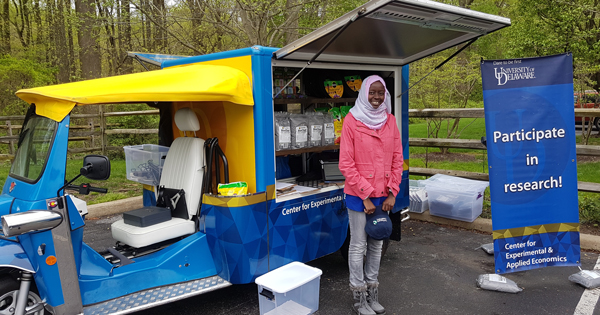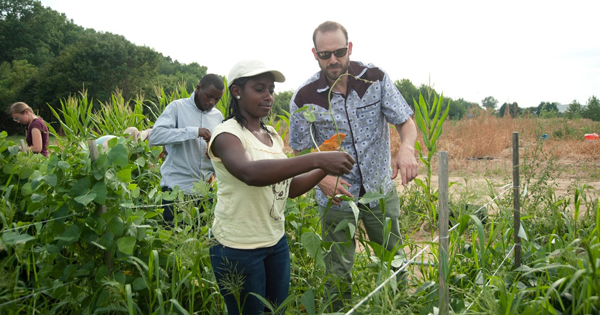
Borel Global Fellows Program
Thanks to a generous gift from Jim and Marcia Borel, the Borel Global Fellows Program supports students from Sub-Saharan Africa to pursue a master’s of science degree at the University of Delaware College of Agriculture and Natural Resources (CANR). The program aims to help increase food security, improve agricultural development and conserve natural resources in Africa by educating scientists at UD who will become knowledge leaders that return to their native countries to promote and improve wealth and health for farmers.
“Our hope is to find future leaders who can learn as much as they can and then make a difference back home.” – Jim Borel
Program details
The Borel Global Fellows Program (BGFP) is unique in that it blends the educational experience at the University of Delaware with an applied research experience in the student’s home country. Students spend 12-18 months at the University of Delaware, completing coursework, developing research skills, and laying the foundation for their research project in partnership with their UD faculty sponsor and their in-country faculty mentor. The next 6-12 months are spent in the student’s home country, completing the majority of their research project and preparing their thesis defense. One to two Borel Global Fellows are supported each year.
Areas of focus
Borel Fellows’ research areas are broad in scope and can include topics in plant and soil sciences, agriculture and resource economics, wildlife ecology and entomology, and animal and food sciences.
Citizen of a Sub-Saharan African country
- B.S. degree (or equivalent) in an area of plant and soil sciences, agriculture and resource economics, wildlife ecology and entomology, or animal and food sciences
- Holding of an advanced degree does not preclude consideration of the Borel Fellows Program
Three to five years of post-graduation work experience in the agricultural or natural resource sectors
A sincere and demonstrated passion to pursue a master’s degree and return to the home country to contribute to agricultural development, increased food security, natural resource conservation and/or agribusiness development
Acceptance to the Borel Global Fellows Program, which ensures placement with a UD/CANR faculty member
Admission to a graduate program in the University of Delaware’s College of Agriculture and Natural Resources
Documented support of an African research institute and an African faculty mentor, as described below
Acceptable scores on the GRE exam, if required by the program of study
Acceptable scores on the TOEFL exam for students coming from non-English speaking countries
Ability to obtain a student visa (F-1) and travel to the U.S. from the home country
Access to reliable internet in the home country
- Sept. 1: Application process opens
- Nov. 15: Application process closes
- Oct. 1 to Dec 1: Rolling internal review of BFGP applicants
- Dec. 15: Finalists are notified and initiate UD application process
Students interested in being considered for the BGFP should apply to the Borel Program before applying to the University of Delaware. The BGFP application outcome may influence one’s interest in pursuing graduate studies at UD. Please follow the steps below to apply to the Borel Global Fellows Program.
Applicants should submit the following to be evaluated for the Borel Global Fellows Program:
Resume or curriculum vitae
Undergraduate transcript(s)
Personal statement describing post-undergraduate agricultural work experience and how the fellowship will aid in advancing their career goals
Names and contact information for three references who can judge the applicant’s scholastic capability and potential for research at the graduate level; references will be contacted for further information once the application is reviewed by UD.
Two letters of commitment are required:
One from an African research institute or university pledging to support the Fellow for the African portion of their fellowship. This support will allow the Fellow to complete the thesis project following return to Africa and may include access to research facilities, office space, internet and libraries. In-kind financial support of the Fellow (typically tuition, fees and research costs) during the African portion of the project must be addressed either in this letter or the letter from the African research director or faculty member.
One from an African research director or faculty member who agrees to partner with the UD faculty member on advising the Fellow’s research project, both while the student is at UD and following return to Africa. In-kind financial support of the Fellow (typically tuition, fees and research costs) during the African portion of the project must be addressed either in this letter or the letter from the African research institute.
All materials should be submitted together in one email to BorelFellows@udel.edu by the deadline above.
Each Borel Global Fellow receives generous financial support, including:
A full waiver of tuition at the University of Delaware;
Coverage of all UD student fees;
A stipend to cover living expenses while in Delaware;
One-time roundtrip airfare (economy class) to/from the U.S.;
Computer allowance of up to $1,000 (purchased in Delaware);
Waiver of the UD application, GRE exam, and TOEFL exam fees;
Reimbursement of SEVIS and visa fees;
Financial support of up to $5,000 for the “in residence” portion of the fellowship in Africa; and
A $1,000 honorarium for the student’s Africa-based advisor to oversee the in-country research portion of the fellowship.
Contact information
For more information on the Borel Global Fellows Program, please send inquiries to BorelFellows@udel.edu.
For more information on UD services and resources for international students, please visit International Student and Scholar Services.
CANR graduate programs
I wanted to share this good news with you because I regard this milestone an immense contribution of the Borel Global Fellowship. This year, I organized a team of 7 graduates, established and registered an NGO, GreenKilimo Tanzania, focused on conservation and restoration of terrestrial ecosystems and clean water and sanitation among others. This would couldn't have been possible without the Borel program.
Former Borel Global Fellow


